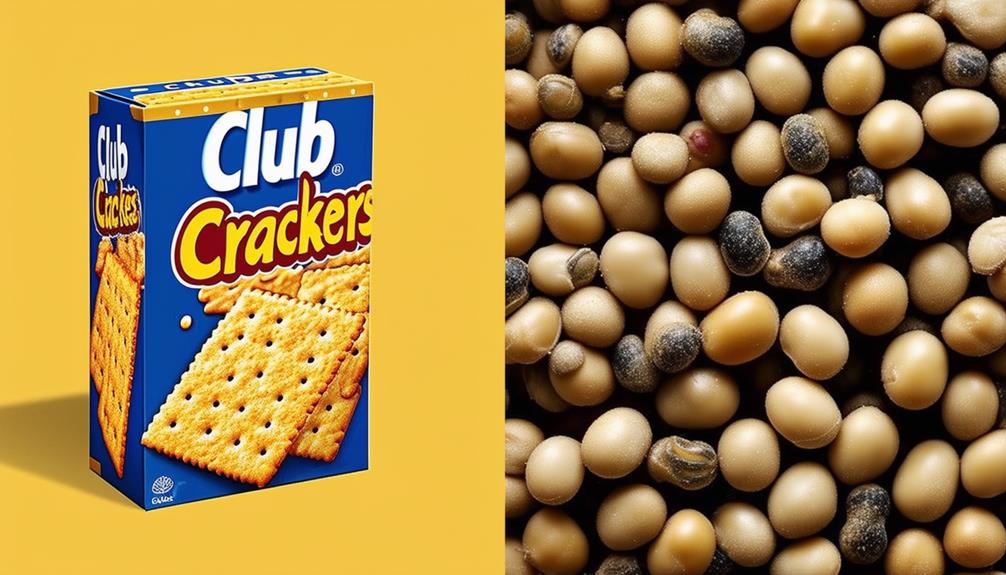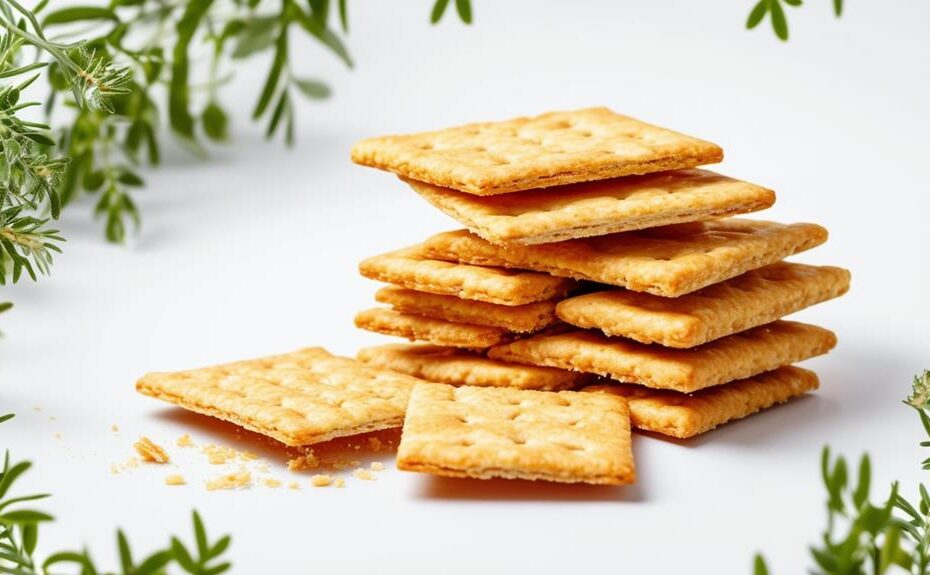When you scan the ingredient list of Club Crackers, you may not think twice about the seemingly innocuous ingredients like soybean oil and sugar, but a closer look reveals that these common additives can have animal-derived origins that may not align with a vegan lifestyle. For instance, sugar derived from bone char and soy lecithin, which can come from fish bladders, are red flags for vegans. Moreover, Club Crackers' multi-grain flavors and sweet ingredients raise concerns about honey and other animal-derived additives. You'll want to examine the ingredients more closely to make sure they align with your dietary choices, and there's more to investigate to make an informed decision.
Crackers in the Vegan World
As you navigate the vegan world, you'll likely find yourself pondering the role of crackers in your diet. Crackers are a staple in many households, but are they vegan-friendly? The answer isn't a simple yes or no. While some crackers are made with animal-derived ingredients, others are perfectly suitable for a vegan lifestyle.
When it comes to crackers, the ingredients matter. Some brands use refined sugar processed with animal bone char, making them non-vegan. However, there are plenty of vegan sugar alternatives available, such as raw, organic, and unrefined options. By choosing these alternatives, you can enjoy guilt-free snacking.
Luckily, there are many vegan cracker options available in the market. You can opt for brands like Nabisco Saltine Crackers, Marys Organic Crackers, Triscuits, 365 Everyday Value Golden Round Crackers, or Keebler Zesta Saltines. With so many options, you can easily find a vegan cracker that suits your taste buds.
Club Crackers' Hidden Ingredients
As you take a closer look at Club Crackers' ingredients, you'll notice that they offer multi-grain flavor options, which might seem like a healthy choice.
However, these crackers are made with enriched flour, which is a refined flour that's stripped of nutrients and fiber.
You'll also find soybean oil and soy lecithin on the ingredient list, which raises questions about the processing methods used to create these ingredients.
Multi-Grain Flavor Options
When you're checking out Club Crackers' Multi-Grain flavor options, you might assume they're all vegan-friendly, but that's not always the case. You need to be aware that some flavors may contain hidden ingredients that aren't present in the Original Crackers.
To make an informed choice, you should scrutinize the ingredient list for these flavors.
- Whole Wheat Flavor Option
- Oatmeal Raisin Flavor Option
- Cinnamon Spice Flavor Option
Whole Wheat Flavor Option
You can opt for the whole wheat flavor option of Club Crackers, which provides a healthier alternative to the original version by offering added fiber and nutrients.
This variety appeals to those seeking a more wholesome snack option.
With its added nutritional benefits, choosing whole wheat Club Crackers can be a nutritious choice for those watching their diet.
Oatmeal Raisin Flavor Option
While exploring healthier snack options, you might consider Club Crackers' Oatmeal Raisin flavor, but beware of its potential non-vegan ingredients. This flavor option may contain refined sugar processed with animal bone char or other hidden additives.
Be sure to scrutinize the ingredient list to determine if it aligns with your vegan diet.
Cinnamon Spice Flavor Option
When trying out the Cinnamon Spice flavor option, you'll discover a unique blend of warm spices and sweetness that enhances the classic Club Cracker experience.
This flavor adds a twist to the traditional Club Cracker, with ingredients like cinnamon, sugar, and spices creating a warm and flavorful taste.
Enriched Flour and Soy
As you examine the ingredients in Club Crackers, you'll notice that enriched flour and soy are prominent components. But what does that really mean? Let's take a closer look at the hidden ingredients within these ingredients.
- Soybean Oil's Refined Origin
- Sugar Derived From Bone Char
- High Fructose Corn Syrup
Soybean Oil's Refined Origin
Soybean oil, a seemingly innocuous ingredient in Club Crackers, has a refined origin that may raise eyebrows among the vegan community. You might wonder, what's behind this refined origin? Here's a breakdown:
| Ingredient | Refined Origin | Impact on Vegans |
|---|---|---|
| Soybean oil | Refined using chemicals | May contain animal-derived by-products |
| Sugar | Refined using bone char | Non-vegan due to animal bone char |
| Enriched flour | Refined using iron, thiamin, niacin, folic acid | Vegan-friendly |
As you can see, soybean oil's refined origin might be a concern for vegans.
Sugar Derived From Bone Char
You might be surprised to learn that sugar, a common ingredient in Club Crackers, has a dark secret: it's often derived from bone char.
This means that the sugar used in Club Crackers mightn't be vegan-friendly.
The use of bone char in sugar refining is a common practice, making it crucial to opt for vegan sugar alternatives or vegan-friendly cracker options.
High Fructose Corn Syrup
Beyond the enriched flour and soybean oil, high fructose corn syrup is another essential component in Club Crackers that raises concerns about their vegan status.
You might wonder why – it's because high fructose corn syrup's processing methods can involve animal-derived products, making it non-vegan.
This hidden ingredient is an important factor to take into account when deciding if Club Crackers align with your vegan diet.
Soy Lecithin's Animal Origin

Now that you've got a better understanding of Club Crackers' hidden ingredients, you're probably wondering if soy lecithin, an emulsifier commonly used in processed foods, has any animal-derived components.
You might be thinking of other food additives that have unexpected animal origins, like gelatin in marshmallows.
As you investigate soy lecithin's animal origin, it's crucial to take into account these hidden animal-derived additives and their impact on vegan diets.
Gelatin in Marshmallows
As you investigate the ingredients of Club Crackers, you'll likely come across some surprising non-vegan culprits. Marshmallows, in particular, can be a trap, and it's important to understand the sneaky ways animal-derived ingredients can sneak in.
From gelatin in marshmallow flavor to confectioner's glaze from insects, it's vital to be aware of these potential pitfalls.
- Gelatin in Marshmallow Flavor
- Confectioner's Glaze From Insects
- L-Cysteine in Dough Conditioner
Gelatin in Marshmallow Flavor
Keep in mind that when you bite into a marshmallow treat, the fluffy texture you're enjoying is often thanks to gelatin, an animal-derived ingredient that's a common component of many marshmallow flavors.
While savoring the sweet taste, keep in mind that gelatin isn't vegan-friendly, making marshmallow flavors with gelatin non-vegan.
Always check labels carefully!
Confectioner's Glaze From Insects
You might be surprised to learn that confectioner's glaze, a common ingredient in candies, is actually made from the shells of the lac bug, making it an animal-derived ingredient that's off-limits to vegans.
This means that sweets coated with confectioner's glaze aren't suitable for a vegan diet. Always check labels to avoid this hidden animal ingredient.
L-Cysteine in Dough Conditioner
While scrutinizing food labels for confectioner's glaze, you should also be on the lookout for L-Cysteine in dough conditioners. This ingredient can be derived from animal sources, making it a non-vegan ingredient to keep an eye out for.
When checking labels, bear in mind that some soy lecithin, derived from soybean oil, may contain L-Cysteine. It is crucial to verify the origin of this ingredient.
Hidden Animal-Derived Additives
As you investigate the ingredients of Club Crackers, you might be surprised to find that some additives have animal-derived origins. You're not just searching for obvious animal products like gelatin or honey; you need to scrutinize the labels for hidden animal-derived additives like soy lecithin. It's time to uncover the truth about these sneaky ingredients that can make a product non-vegan.
- L-Cysteine, an amino acid often derived from human hair or duck feathers, is used in some bread products.
- Carmine, a red food coloring, is made by crushing cochineal beetles.
- Isinglass, a fining agent used in beer and wine, is derived from fish bladders.
L-Cysteine From Human Hair
In the complex world of food additives, an eye-opening truth lurks: L-cysteine, an amino acid commonly used to soften dough, can be derived from an unexpected source – human hair.
You might be surprised to learn that L-cysteine from human hair can end up in your crackers. This additive's origin is essential to contemplate for vegans ensuring their snacks are truly plant-based.
Carmine From Crushed Beetles
You might be surprised to learn that carmine, a vibrant red food coloring, gets its deep hue from the crushed shells of cochineal beetles, making it an unexpected animal-derived ingredient lurking in some food products.
As a vegan, it's important to be aware of carmine's presence in certain products, like cosmetics and food items, and opt for vegan-friendly alternatives instead.
Isinglass From Fish Bladders
Dig deeper into the ingredient list, and you might uncover a surprising source of soy lecithin: fish bladders, which are used to produce isinglass, a common additive in food processing.
This means that soy lecithin, often found in processed foods like crackers, can potentially come from an animal source, making it non-vegan.
Verify the source to guarantee true veganism.
Honey From Bee Exploitation
As you scrutinize food labels, another hidden animal-derived additive to watch out for is honey, which is often obtained through bee exploitation. Like soybean oil, honey is commonly used in food products, including Club Crackers.
Be sure to check the ingredients list, as honey mightn't be explicitly labeled as an animal-derived ingredient, making it crucial to stay vigilant.
Veganism Beyond Club Crackers
Beyond the confines of Club Crackers, veganism unfolds as a holistic lifestyle that permeates every aspect of daily life, from the food on your plate to the clothes you wear.
As you investigate veganism, you'll realize it's not just about what you eat, but also what you wear and use. For instance, when baking vegan treats, you'll opt for plant-based milk and wheat flour instead of dairy products.
This lifestyle choice promotes compassion towards animals, environmental sustainability, and personal health benefits. You'll find it easy to embrace, with vegan options widely available in grocery stores, restaurants, and online platforms.
Frequently Asked Questions
Do Club Crackers Have Dairy?
You're wondering if Club Crackers have dairy, and the answer is no, they don't! You can breathe a sigh of relief, as they're made without dairy ingredients, making them a great snack option for those with dairy allergies or intolerance.
What Kind of Crackers Are Vegan?
You're looking for vegan crackers! Opt for brands like Mary's Gone Crackers, Simple Mills, or Crunchmaster, which use plant-based oils, whole grains, and natural flavors, ensuring no animal-derived ingredients are present.
Are Club Minis Vegan?
You're wondering if Club Minis are vegan, but unfortunately, they're not due to refined sugar processed with animal bone char; however, you can opt for vegan alternatives like Nabisco Saltine Crackers or Marys Organic Crackers instead.
Are Ritz Crackers Vegan?
You're wondering if Ritz Crackers are vegan, but unfortunately, they're not – they contain dairy ingredients like whey and buttermilk, making them unsuitable for a vegan diet.
Conclusion
So, are club crackers vegan? Unfortunately, the answer is no. Club Crackers contain soy lecithin, an emulsifier derived from animal sources, making them non-vegan.
While this may be a disappointment, there are plenty of vegan-friendly cracker options available. Remember, being vegan is about more than just food choices; it's a lifestyle.
Stay informed, stay vigilant, and always read those labels!
